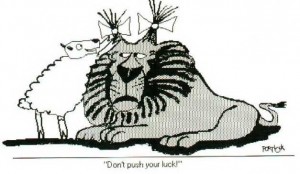You should catch up on Part One and Part Two.
These questions begged a much bigger one:
Could the Church be involved in politics at all?
Here we were, responding to a jihad by declaring a crusade. I began to wonder how any of the words that Jesus ever said, especially in key teachings of the Sermon on the Mount that could warrant even the most just war. Moreover, could a Christian even be an American (or a Brit or Afghani or Brazilian)? What if we went beyond politics to lifestyles? Could a Christian pursue the American dream? Buy products produced unethically? Eat food slaughtered violently or grown in a way that endangers the environment? Prize safety and good neighborhoods over proximity to the poor?
These are questions I still struggle with today. On one hand, I believe that there is value in cultural engagement. The church cannot abandon culture. Yet history and experience teach us that in our attempts at relevance, we quickly take up the morays of the culture, and become something much less than the Church.
The Anabaptist movement, for centuries, has stood for unpopular things. They were martyred for their belief that an adult chooses their faith, not their family or the State. Even today, their mennonite and amish and christoanarchist descendants fight against the constant creep of civic religion. During Vietnam, Mennonite Conscientious Objectors were sent to staff psychiatric hospitals. Their humanizing treatment of the mentally ill has led to many advances in patient care.
When I asked an mennonite preacher what their hermeneutic was, he responded “The Sermon on the Mount.” As a person wanting to live like Christ in the midst of the longest war in American history, their way of life just makes sense.
My dream is to be a part of a community shaped by the story and teachings of Christ. The Church does this both in spite of the world, and simultaneously for the world. This may mean abandoning the comfort and structures that America has to offer, and living as a stranger in one’s own land. It may be that this countercultural, underground radical community grounded in obedience to the teachings of Christ is the best hope of us, our churches, and our neighborhood. We can thank Osama bin Ladin for teaching us.




 y roommate Trevor has been watching HBO’s Rome. It’s about Julius Caesar dismantling the Republic and becoming Emperor. We’ve seen similar demonstrations: countries whose
y roommate Trevor has been watching HBO’s Rome. It’s about Julius Caesar dismantling the Republic and becoming Emperor. We’ve seen similar demonstrations: countries whose 
 military might is constantly fighting over who is in control. But I don’t think that’s what is going to happen on Tuesday.
military might is constantly fighting over who is in control. But I don’t think that’s what is going to happen on Tuesday.





 Tweets
Tweets